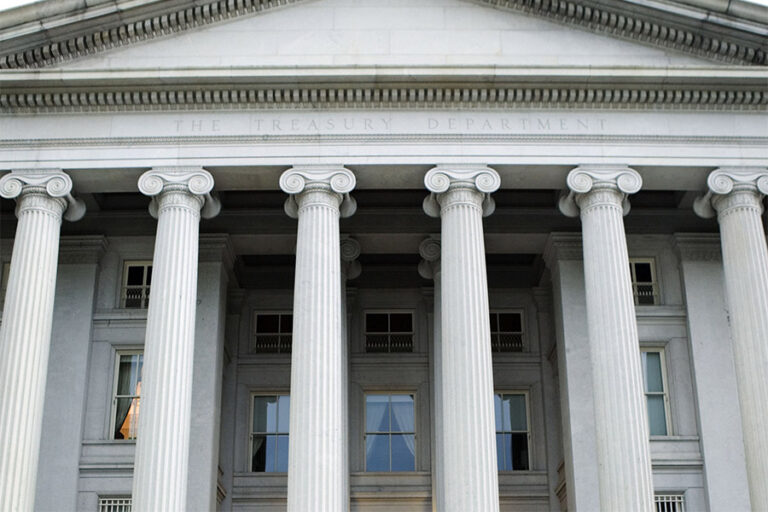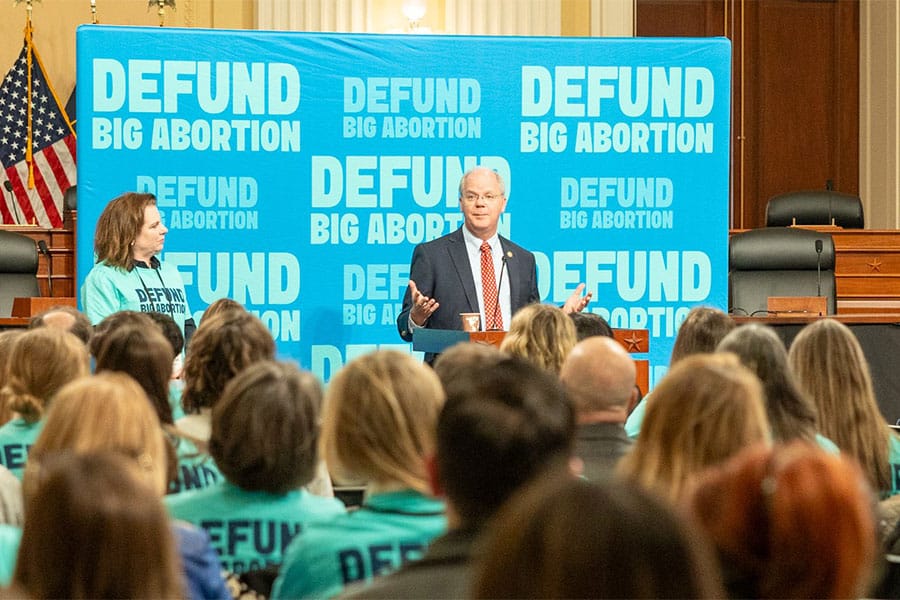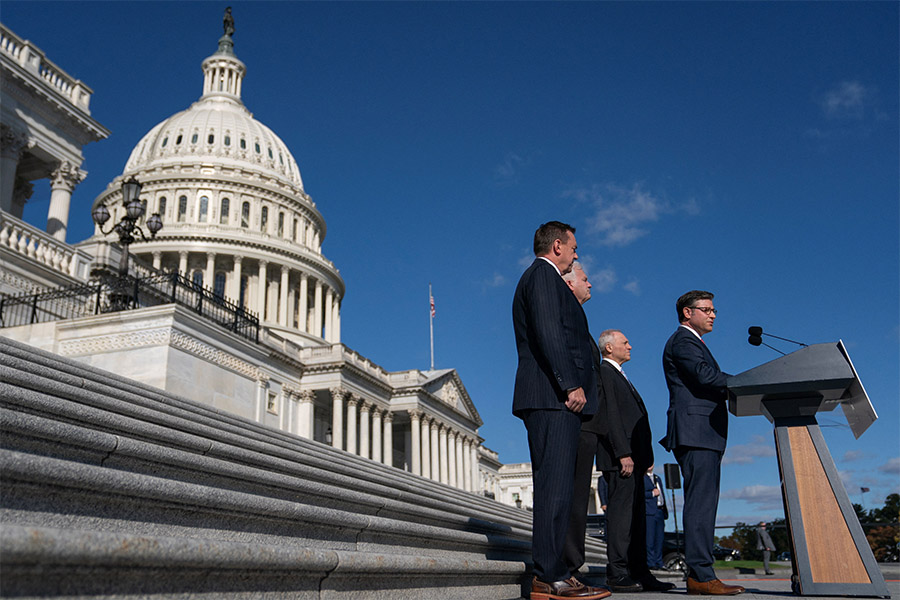With just one day to spare, the federal government Jan. 18 narrowly averted another potential shutdown, as Congress overwhelmingly agreed to an early March funding extension — the third such extension in four months.
Battles over the escalating size of the national budget — and with it, the national debt — are a key point of contention between lawmakers as they wrestle to draft a long-term spending agreement that would eventually finalize annual federal spending for the remainder of the 2024 fiscal year that ends Sept. 30.
For those Catholics actively ministering to the poor, congressional spending and saving priorities — when measured against the concerns of Catholic social teaching — might appear imbalanced.
But is the federal budget a moral statement? And federal borrowing a moral issue?
“Of course it is a moral document,” Joseph P. Kaboski, an economics professor and fellow at the Kellogg Institute for International Studies at the University of Notre Dame, told OSV News. “Any budget tells you something about what you prioritize.”
The federal budget is, of course, not the only budget, he emphasized.
“You have to think of it as also reflecting what priorities you think the federal government should have in relation to states, local governments, individuals, etc. But the fact that it is a moral document is important to keep in mind — even as addressing the debt is a moral action,” noted Kaboski, who is a past president of the Catholic Research Economists Discussion Organization.
“The U.S. bishops have tried to stress that this can’t be done by hurting the most vulnerable,” he said. “This is a challenge because it’s reached the point where we all may need to tighten our belts a bit — but certainly, those who have the most ability to pay should be bearing the bulk of the burden.”
On May 17, 2023, the U.S. Conference of Catholic Bishops’ Committee on Domestic Justice and Human Development and the USCCB Committee on International Justice and Peace — in conjunction with Catholic Relief Services and Catholic Charities USA — sent a letter to Congress regarding the federal debt limit.
“In light of the national deficit and inflation, Congress faces difficult choices about how to balance needs and resources and allocate burdens and sacrifices. These choices are economic, political, and moral,” the letter read.
“A just framework for future budgets cannot rely on disproportionate cuts in essential services to poor and other vulnerable persons,” it said. “It requires shared sacrifice by all, including raising adequate revenues, eliminating unnecessary spending, and addressing the long-term costs of health insurance and retirement programs fairly.”
It’s hardly the first time the U.S. bishops have spoken out on the topic.
Their 1986 teaching document, “Economic Justice for All: Pastoral Letter on Catholic Social Teaching and the U.S. Economy,” was explicit: “Decisions must be judged in light of what they do for the poor, what they do to the poor and what they enable the poor to do for themselves. The fundamental moral criterion for all economic decisions, policies, and institutions is this: They must be at the service of all people, especially the poor.”
In a 2023 federal budget of $6.13 trillion, economic security programs accounted for about 8 percent — $522 billion — supporting initiatives that provide aid to individuals and families in distress. That latter figure doesn’t include health insurance or Social Security benefits.
Outlays for government departments include: Department of the Treasury, $1.1 trillion (covers Social Security, Medicare, veterans benefits and other spending required by law); Department of Defense, $775.9 billion; Department of Homeland Security, $89 billion; Justice Department, $44.3 billion; and International Assistance Programs (funding includes global health programs, migration and refugee programs, food programs, international disaster aid and the like), $36.1 billion.
The current federal debt is $34.1 trillion and climbing.
“Our debt is quite high right now, about what it was at its peak during World War II — but obviously, we are not involved in a world war,” Kaboski said. “Economists usually measure debt relative to GDP — essentially, our national debt relative to our ability to pay for it — and that is about 125 percent.”
As Treasury.gov notes, “Federal revenue is commonly compared to gross domestic product (GDP). This comparison provides a sense of the size of the federal government’s earnings in relation to the total amount of the entire country’s economic output. … In FY 2023, the federal government spent $6.13 trillion. Since the government spent more than it collected, the deficit for 2023 was $1.70 trillion.”
“The U.S. budget is dominated by three main things,” explained Anthony M. Annett, author of “Cathnomics: How Catholic Tradition Can Create a More Just Economy.” He said, “Defense spending, which never gets touched — in fact, it grows every year — and Social Security and Medicare, which are extremely popular, universal programs that benefit the middle class. They’re generally pretty safe.”
“What’s not safe,” he emphasized, “are the smaller programs that benefit the poor — the income support and the social safety net.” Because the poor “don’t have an adequate political voice in the system,” said Annett, “we do not have a true preferential option for the poor. We have a preferential option for the rich, in fact. So those programs are the first to get cut.”
Options to balance the budget and diminish the debt are, Annett said, limited.
“In bad times, it’s OK to borrow to kind of cushion the economy. But you can’t borrow indefinitely,” he stressed. “So the only option is, you either cut spending … or the alternative is to raise taxes.”
As “Economic Justice for All” observes, “The tax system should be continually evaluated in terms of its impact on the poor.” The document says the system should “raise adequate revenues to pay for the public needs of society,” should be progressively structured so that those with “greater financial resources pay a higher rate of taxation” and “families below the official poverty line should not be required to pay income taxes.” By definition, these families, the document explains, don’t have “sufficient resources to purchase the basic necessities of life,” and so should not have “the additional burden of paying income taxes.”
“There is pressure not to expand public spending, which clearly impacts the poor, communities and families,” noted Kaboski. “Raising taxes doesn’t hit the poor much, but it does impact families and communities.”
“During COVID — with both the Trump and Biden administrations — we had a big expansion of the welfare state,” Annett explained. “Checks were issued to individuals, which gave people income and wealth. We had a child tax credit which actually reduced child poverty by 40 percent. And all of this went away,” he said, adding that “child poverty has basically jumped back up again.”
It is highly unlikely, Annett reflected, that the so-called “social safety” will ever be expanded again.
“Some people blame the 2021 burst of inflation on that welfare spending — I don’t think that’s quite fair, but that’s the perception,” he said. “And I think there will be a general reluctance in the future to do a big fiscal stimulus like that, out of the fear of inflation.”
“The complaint that the debt is high often prevents expenditures on social services,” observed Daniel K. Finn, a professor of economics and theology at St. John’s School of Theology and Seminary in Collegeville, Minnesota.
“We ought to be seeing our tax contributions — whether to the local school district or the local county or the national government — as our contribution to the common good,” Finn emphasized, “rather than, ‘This is those guys out there trying to take my money.’ The common good is impossible if we don’t pay our taxes.”
Americans, Finn noted, perceive themselves as highly taxed — however, the U.S. doesn’t even rank in the top 10 for either personal or corporate taxes worldwide.
“If we were to just raise our taxes to the average for all industrialized countries,” Finn said, “we would have $2 trillion dollars more per year to spend, or prevent the debt rising.”
Whether that is politically feasible is another question.
“Democrats don’t want to cut spending and Republicans don’t want to raise taxes,” said Kaboski.
“It’s always the question of why are you doing this — the poor and workers and low-income families, how are they most impacted? That’s always the question we ask no matter what the technical debate is,” said Brian R. Corbin, executive vice president of member services at Catholic Charities USA.
“Catholic Charities are very concerned about the debt and the deficit and the budget as they all interact,” Corbin explained, “but more importantly, as a church, (we need to be) asking the right questions.”
Among those questions is the issue of fiscal fairness.
“Why are the poor always the first to be cut when you’re talking about the debt? It’s the moral question,” Corbin reflected. “I think that’s where our power and our voice is, in a very good way — that’s what Jesus called us to do.”
So how can a situation as complicated as a fair and responsible federal budget be resolved?
“I think we just have to keep on asking the questions — and keep on at least asking Congress to reconsider things … letting them know someone’s watching and asking these questions,” Corbin said. “I think it’s important for citizens, and it’s important for congressional leaders — just to know that their constituents are asking these questions. It’s our job.”
Read More U.S. Congress
Copyright © 2024 OSV News









